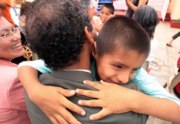
Peru (MNN) — Buckner International faced challenges as they tried to get a foster care program started in Peru. This month, however, they got the pilot program rolling by placing the first seven children with foster parents.
Buckner hopes to place at least 60 children in foster care through this pilot program. The historic event on March 10 was an emotional one. "The kids were crying, and the parents were crying," said Leslie Chace.
These children have grown up in an orphanage that is made up of 100 children, and about 65
of them are special needs. The immediate solution of getting the children out of an institutionalized setting was foster care. The term "foster care" did not exist in the country until Buckner gave it a name. They call it "acojimiento familiar," which means "to admit into your house as a guest" or "to offer protection."
"The children come from abused families. They come from a lot of families that are very poor and aren't able to take care of them, or their parents are either drug addicts or have severe problems," added Chace. Some of the families are still able to visit their children, so educating them on the difference between adoption and foster care was a challenge. "You'll find a family that's living in total poverty and not able to care for their child–the father is, maybe, abusive– and they still have a hard time letting that child go even though they hardly see them. They think that, being in the orphanage, there's still a chance that they can see them once in a while. So we've had to reassure them and educate them," she said.
At first it was also a challenge to get foster families. But now, the government is
helping them advertise the foster program through television and posters throughout the city. Buckner's goal is to make foster care a public policy for children who need to be taken from their biological parents in crisis situations.
One of Buckner's main goals is to help the children to continue to see the Lord's love. "We've gone to the churches and tried to work with the Christian families. That way, the kids will be able to have a Christian education and families that really care for them," said Chace. The first seven families were chosen out of 43 families that were interviewed.
